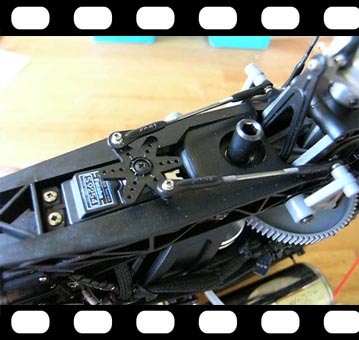Servo Jitter
Two causes of servo jitter can be distinguished: noise picked up by the receiver,
and noise caused within the servo itself.
Only PPM receivers can 'pick up noise', as PCM receivers will filter out all noise
and go to failsafe in extreme noise, thus never showing servo jitter.
noise caused in the servo
Servo noise can be caused by loose connectors to the servo, and also by
a broken servo.
Typically, a broken servo involves a worn out potmeter.
Usually this causes a problem around the most often used position of the servo
(the neutral position in most cases). 'Worn out' not necessarily means
that the potmeter is totally worn out, it can also be that part of the carbon in the potmeter
was scraped off and is causing noise on the pot readout. If the servo is fast enough,
it will 'correct' the noise and cause jitter.
The movie illustrates the jitter I encountered around the neutral of my 9254 servos,
most likely due to carbon dust as inspection showed that the potmeters looked okay
good but replacement of them still solved the problem.
These 9254 servos seem especially sensitive to this kind of dust,
as I had already two of them with this problem.

|
Noise around neutral due to worn out potmeter.
Note that the servo oscillations are barely visible on the video,
as they are small and very fast because this servo is very fast.
You can only see slightly blurred ball links.
The vibration is very visible on the paddles and main blades (out of view).
The noise is very obvious though.
|
|
noise picked up by receiver
If the receiver picks up noise, this can have many causes.
First of all, of course check the Tx and Rx antennas and power supplies.
HF noise on the power supply (regulator?) can cause a lot of problems.
The Rx antenna has to be more or less straight and not flat against or inside
something conducting (metal, carbon fibre etc).
Do not fold it back onto itself, wind it up tight around something, cut it shorter, etc.
The antennas have to be at their full
length to get the max range.
Then, there may be radio noise generated by the heli itself.
Many potential sources of radio noise exist. Check this
web page for a broader discussion.
Typical things to check are vertical play in starter (and shaft) axes, broken bearings
(even the one INSIDE the engine may cause radio noise),
loose fan, metal throttle lever (use plastic instead) and
that the tailboom screws are tight, and the ones that might touch the
tail boom itself are taped so that there is no metal-metal connection.
Even putting the starter pin onto the starter shaft may cause jitter with PPM systems!
Some parts have very slight play, for instance there usually is
a very small horizontal play in the starter shaft-
you can hear a small clicking when pulling the starter shaft sideways.
Typically, highly stressed metal on metal parts need the most attention,
such as the engine, tail and main shaft.
Also it is useful to check the effect at another location.
If the problem disappears at the other location, it may well be that
something else (local TV station? Cellular phone antennas? etc) is causing
radionoise.
© W.Pasman, 15/4/01, up date 31/8/5
